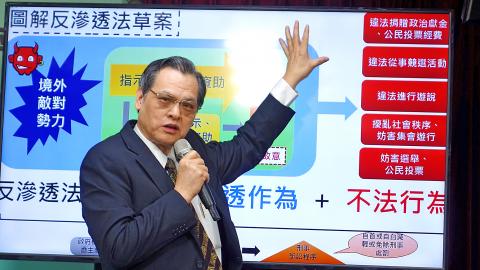The Anti-infiltration Act (反滲透法) is to take effect today, the Presidential Office said yesterday on its Web site.
The 12-article law, passed by the Legislative Yuan on Dec. 31, prohibits people acting on the instructions of or with the funding of “infiltration sources” from illegal campaigning or lobbying, or receiving illegal political donations, as well as disrupting social order, peaceful assemblies, elections or referendums.
While the activities are already defined as illegal in the Criminal Code, the Assembly and Parade Act (集會遊行法), the Presidential and Vice Presidential Election and Recall Act (總統副總統選舉罷免法) and the Civil Servants Election and Recall Act (公職人員選舉罷免法), the Anti-infiltration Act stipulates the punishments are applicable to people who break those laws on the instructions or with the financial support of infiltration sources, the Mainland Affairs Council (MAC) said.

Photo: Wang Yi-sung, Taipei Times
The Anti-infiltration Act applies only to people “who intentionally break the law, and not to those who are unaware of the situation,” the council added.
It stipulates that people who are influenced by infiltration sources and conduct illegal lobbying would be fined between NT$500,000 and NT$5 million (US$16,699 and US$166,990).
If the lobbying concerns national security issues, such as national defense, diplomacy and cross-strait affairs, the punishment would be a maximum of three years in prison or a fine of up to NT$5 million.
The Anti-infiltration Act states that for people who are influenced by infiltration sources and contravene articles 149 to 153 of the Criminal Code by disrupting social order, or Article 31 of the Assembly and Parade Act by disrupting peaceful assemblies and parades, the sentence would be increased by half of what is stipulated in the Criminal Code and the Assembly and Parade Act.
People who are influenced by infiltration sources to participate in illegal campaign activities, thus contravening the Presidential and Vice Presidential Election and Recall Act or the Civil Servants Election and Recall Act, would be sentenced to a maximum of five years in prison, or fined up to NT$10 million.
The Anti-infiltration Act states that people under the influence of infiltration sources who disrupt elections, recalls or referendums and contravene either of the two election and recall acts, would face a sentence increased by half of what is stipulated in the two acts.
A life sentence or a minimum of 15 years in prison would be given to those under the influence of infiltration sources who disrupt public gatherings such as an election or petition rally.
The Anti-infiltration Act aims to fend off infiltration, rather than curb all cross-border exchanges, the council said, adding that it would not restrict regular exchanges across the Taiwan Strait.

MAKING WAVES: China’s maritime militia could become a nontraditional threat in war, clogging up shipping lanes to prevent US or Japanese intervention, a report said About 1,900 Chinese ships flying flags of convenience and fishing vessels that participated in China’s military exercises around Taiwan last month and in January last year have been listed for monitoring, Coast Guard Administration (CGA) Deputy Director-General Hsieh Ching-chin (謝慶欽) said yesterday. Following amendments to the Commercial Port Act (商港法) and the Law of Ships (船舶法) last month, the CGA can designate possible berthing areas or deny ports of call for vessels suspected of loitering around areas where undersea cables can be accessed, Oceans Affairs Council Minister Kuan Bi-ling (管碧玲) said. The list of suspected ships, originally 300, had risen to about

DAREDEVIL: Honnold said it had always been a dream of his to climb Taipei 101, while a Netflix producer said the skyscraper was ‘a real icon of this country’ US climber Alex Honnold yesterday took on Taiwan’s tallest building, becoming the first person to scale Taipei 101 without a rope, harness or safety net. Hundreds of spectators gathered at the base of the 101-story skyscraper to watch Honnold, 40, embark on his daredevil feat, which was also broadcast live on Netflix. Dressed in a red T-shirt and yellow custom-made climbing shoes, Honnold swiftly moved up the southeast face of the glass and steel building. At one point, he stepped onto a platform midway up to wave down at fans and onlookers who were taking photos. People watching from inside

Japan’s strategic alliance with the US would collapse if Tokyo were to turn away from a conflict in Taiwan, Japanese Prime Minister Sanae Takaichi said yesterday, but distanced herself from previous comments that suggested a possible military response in such an event. Takaichi expressed her latest views on a nationally broadcast TV program late on Monday, where an opposition party leader criticized her for igniting tensions with China with the earlier remarks. Ties between Japan and China have sunk to the worst level in years after Takaichi said in November that a hypothetical Chinese attack on Taiwan could bring about a Japanese

STREAMLINED: The dedicated funding would allow the US to transfer equipment to Taiwan when needed and order upgraded replacements for stockpiles, a source said The US House of Representatives on Thursday passed a defense appropriations bill totaling US$838.7 billion, of which US$1 billion is to be allocated to reinforcing security cooperation with Taiwan and US$150 million to replace defense articles provided to the nation. These are part of the Consolidated Appropriation Act, which the US House yesterday passed with 341 votes in favor and 88 against. The act must be passed by the US Senate before Friday next week to avoid another government shutdown. The US House Committee on Appropriations on Monday unveiled the act, saying that it allocates US$1 billion for the Taiwan Security Cooperation Initiative